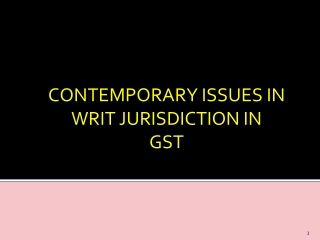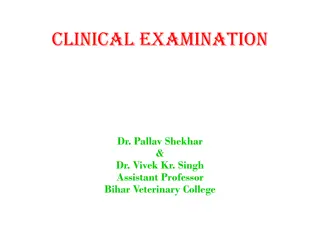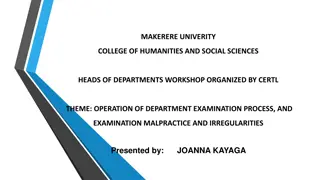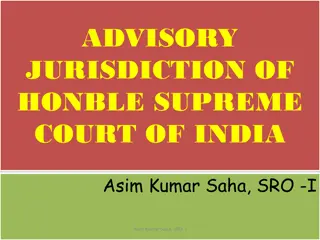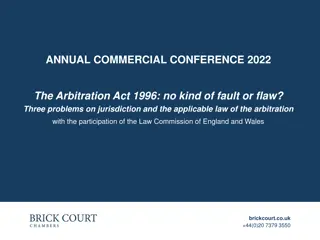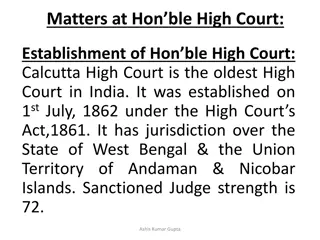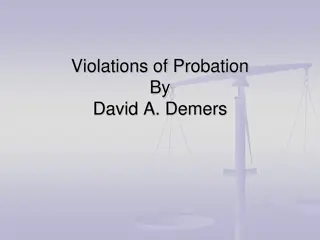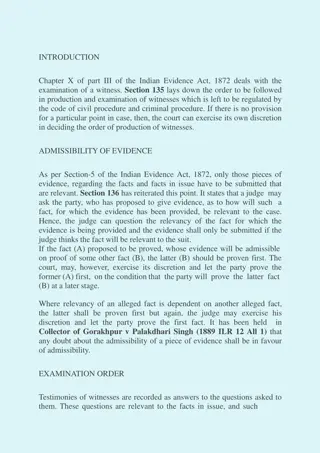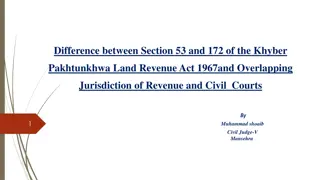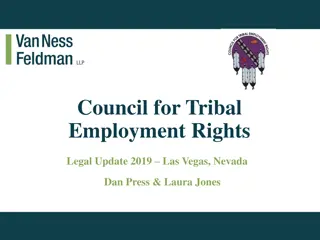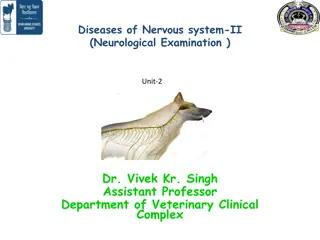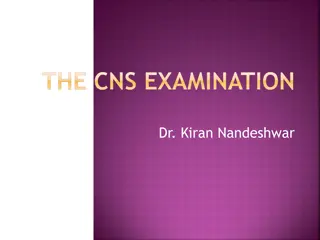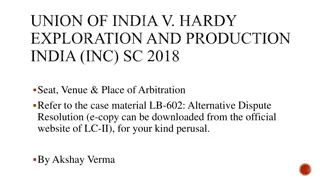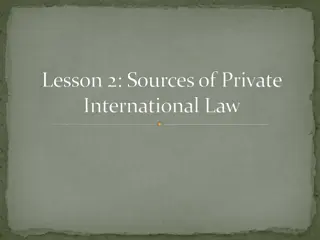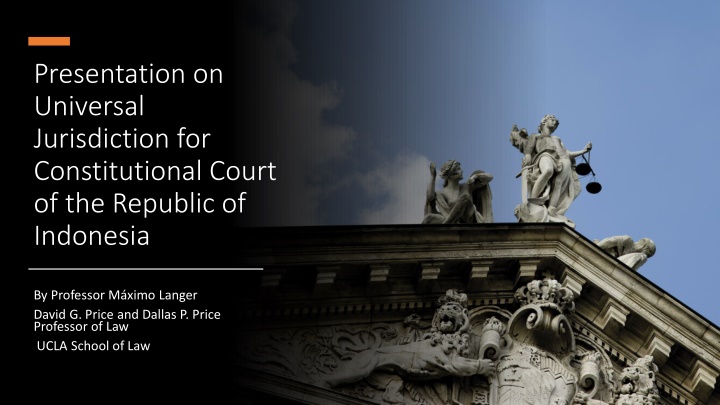
Universal Jurisdiction in International Law: A Comprehensive Examination
This presentation delves into the concept of universal jurisdiction in the context of international law, exploring its history, application in cases of mass atrocities, and impact on international relations. The discussion covers examples of international crimes, responses by the international community, goals of universal jurisdiction, and arguments regarding its effects on international relations. Professor Máximo Langer, David G. Price, and Dallas P. Price of UCLA School of Law provide expert insights in this informative session.
Download Presentation

Please find below an Image/Link to download the presentation.
The content on the website is provided AS IS for your information and personal use only. It may not be sold, licensed, or shared on other websites without obtaining consent from the author. If you encounter any issues during the download, it is possible that the publisher has removed the file from their server.
You are allowed to download the files provided on this website for personal or commercial use, subject to the condition that they are used lawfully. All files are the property of their respective owners.
The content on the website is provided AS IS for your information and personal use only. It may not be sold, licensed, or shared on other websites without obtaining consent from the author.
E N D
Presentation Transcript
Presentation on Universal Jurisdiction for Constitutional Court of the Republic of Indonesia By Professor M ximo Langer David G. Price and Dallas P. Price Professor of Law UCLA School of Law
I. Introduction: Mass Human Rights and International Crimes Examples of Mass Atrocities: Armenian genocide. Holocaust. Mass human rights violations in Latin America in the 70s and 80s. International crimes in the Former Yugoslavia. Genocide in Rwanda. International crimes in Syria. Genocide and other international crimes against Rohingya. International crimes committed by Islamic State. Etc.
What Has the International Community Done In Response to International Crimes When the State Where the Crimes Were Committed Does Not Punish Them? International criminal tribunals. International Criminal Court. Mixed courts. Investigating mechanisms. Transnational prosecutions.
Universal jurisdiction has been the basis for many transnational prosecutions of international crimes. Under the universal jurisdiction principle, any state may prosecute, adjudicate and punish certain crimes even if the state did not have any territorial, national or national-interest link with the crime when the crime was committed. These crimes include crimes against humanity, genocide, torture, and war crimes. Universal Jurisdiction Principle
Critics of universal jurisdiction have argued that it would bring substantial disruption to international relations. Plaintiffs in this case have asked me to analyze this issue as an expert on international criminal law in general and on universal jurisdiction in particular. My overall conclusion is that universal jurisdiction over crimes against humanity, genocide, torture, and war crimes has not brought substantial disruption to international relations. Universal Jurisdiction and International Relations
1) If universal jurisdiction brought substantial disruption to international relations, there would not be a very substantial number of States around the world that have adopted universal jurisdiction statutes over crimes against humanity, genocide, torture, and war crimes. I base my conclusion that universal jurisdiction has not brought substantial disruption to international relations on the following arguments: 2) If it brought substantial disruption to international relations, the number of universal jurisdiction cases over crimes against humanity, genocide, torture, and war crimes would have diminished over time. 3) If it had brought substantial disruption to international relations, the number of universal jurisdiction trials over crimes against humanity, genocide, torture, and war crimes would not have increased over time. 4) Universal jurisdiction has not brought substantial disruption to international relations, because universal jurisdiction trials have concentrated on cases that the international community agrees that they should be tried and punished.
First Argument If universal jurisdiction brought substantial disruption to international relations, there would not be a very substantial number of States around the world that have adopted universal jurisdiction statutes over crimes against humanity, genocide, torture, and war crimes. But many States have adopted universal jurisdiction legislation over one or more of these crimes.
By September 1, 2012, 147 out of 193 United Nations members had provided universal jurisdiction over crimes against humanity, genocide, torture, and/or war crimes (Amnesty International, Universal Jurisdiction. A Preliminary Survey of Legislation Around the World 2012 Update, pp. 2 and 12). By September 1, 2012, out of 193 United National Members, at least 136 of States had provided universal jurisdiction over war crimes, 80 over crimes against humanity, 94 over genocide, and 85 over torture (Amnesty International, Universal Jurisdiction. A Preliminary Survey of Legislation Around the World 2012 Update, pp. 12 and 13). If universal jurisdiction over these crimes brought strong disruption to international relations, one would not expect that a large majority of States had adopted universal jurisdiction statutes over at least one of these four crimes. Very substantial number of States around the world have adopted universal jurisdiction statutes over crimes against humanity, genocide, torture, and war crimes.
Second Argument If universal jurisdiction brought substantial disruption to international relations, the number of universal jurisdiction cases over crimes against humanity, genocide, torture, and war crimes would have diminished over time. But instead, they have increased in the last twenty years and over time.
Figure 1: Universal Jurisdiction Cases Over Time Source: Langer s Universal Jurisdiction Database 265 212 200 Number of Cases 175 128 100 96 84 84 81 81 79 73 72 67 58 57 56 51 51 50 47 43 37 37 34 36 21 17 13 11 7 1 1 1960 1980 2020 2000 Year
Third Argument If it had brought substantial disruption to international relations, the number of universal jurisdiction trials over crimes against humanity, genocide, torture, and war crimes would not have increased over time. But instead, they have increased over time.
Figure 2: Universal Jurisdiction Trials Over Time Source: Langer s Universal Jurisdiction Database 10 9 8 7 Number of Trials 6 5 4 3 2 1 0 1950 1960 1970 1980 1990 2000 2010 2020 2030 Year Trial Ended
Fourth Argument Universal jurisdiction has not brought substantial disruption to international relations, because universal jurisdiction trials have concentrated on cases that the international community agrees that they should be tried and punished. Over 70% of universal jurisdiction trials have been on situations the international community has agreed they must be prosecuted.
Table 1: Universal Jurisdiction Trials By Type of Defendant Source: Langer s Universal Jurisdiction Database Former Yugoslavia Nazis Rwanda Syria Iraq/Islamic State Other Total Number of Trials by Type of Defendant 5 11 26 15 9 15 81 Percentage of Universal Jurisdiction Trials by Defendant's Nationality 6.17% 13.58% 32.10% 18.52% 11.11% 18.52% 100%
Immunity (International Court of Justice, Congo v. Belgium, 2002). Presence or even residence requirements to launch universal jurisdiction proceedings. Requiring that the State where alleged crime was committed has not prosecuted it. Prosecutorial discretion to select cases. Safeguards and Tools States Have Used to Prevent Abuse of Universal Jurisdiction and to Concentrate in Cases International Community Agrees That Must Be Prosecuted
Database contains information on every known criminal complaint (or case considered by public authorities on their own motion that: Langer Universal Jurisdiction Database involved the alleged commission of crimes against humanity, genocide, torture, or war crimes; was filed between 1957 and 2020; and relies fully or partially on the principle of universal jurisdiction Database has information about initiation, investigation, formal proceedings, arrests attempted, arrests made, and trials The database currently contains 2167 cases.

